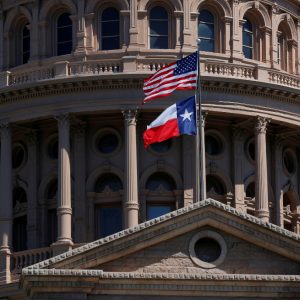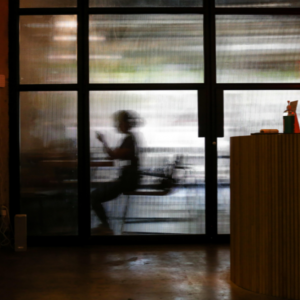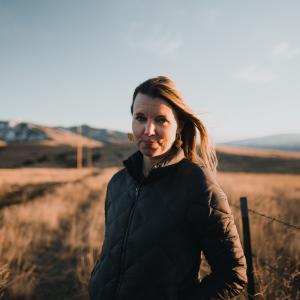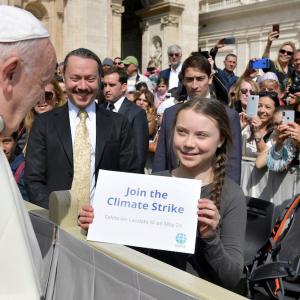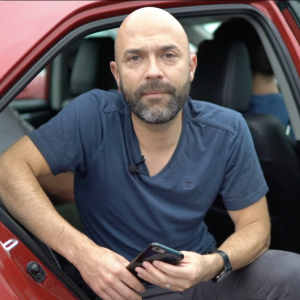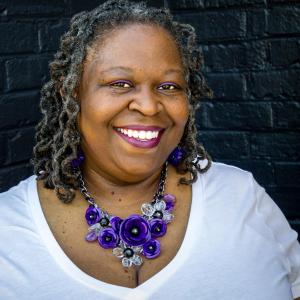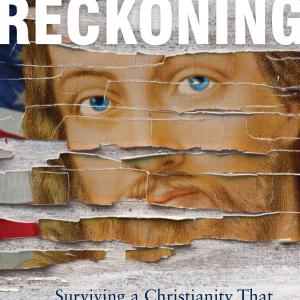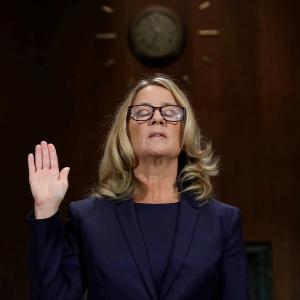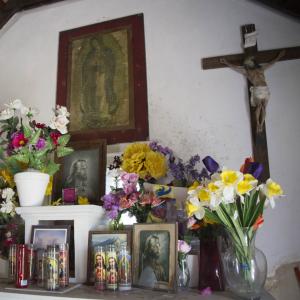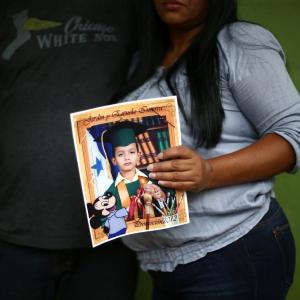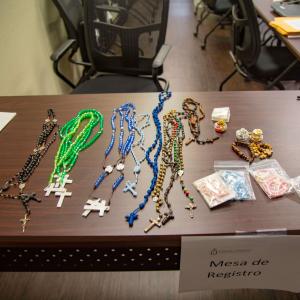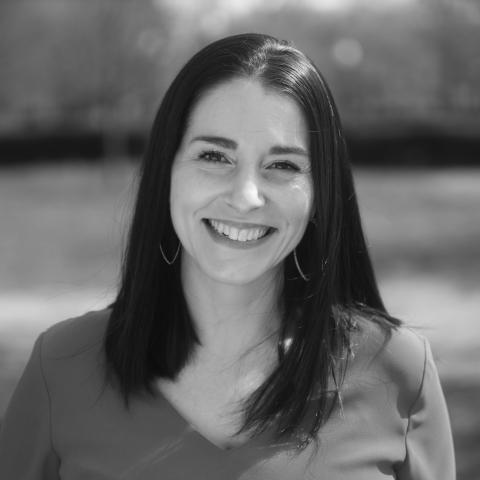
Sandi Villarreal is former editor-in-chief of Sojourners. She came to Sojourners in 2012 after starting her career in print newspaper reporting and veering quickly into digital media and online journalism. Sandi holds a master's degree in journalism from the Medill School of Journalism at Northwestern University and a bachelor's degree in journalism and political science from Baylor University. She has worked in both print and online journalism, publishing, digital marketing, and nonprofit community development.
Sandi is most interested in writing about the intersection of faith, politics, and culture, especially as it relates to women's leadership both within our churches and on the political stage. Sandi has earned awards for her news and commentary writing, as well as for her work as editor of Sojourners' online publication.
Posts By This Author
On the Longest Night of the Year, We Sit Together in the Darkness
Blue Christmas gatherings offer a place for grief.
Maybe There’s No Moral to the Story
A conversation with Kate Bowler.
“Trying to make our lives meaningful all the time is so stupid,” says Kate Bowler. “We can’t make every minute into a moment. Sometimes you just have to pay bills and show up for your friend and listen to her talk again about whether she should dump her boyfriend — and she should — and be in a faculty meeting and be in traffic.”
Texas Clergy Are Taking a Stand Against the New Abortion Law
When the Supreme Court last week refused to block a new Texas law — which bans abortion after about six weeks of pregnancy and allows private citizens to sue abortion providers and anyone who “aids or abets” someone getting an abortion after six weeks — faith groups like Texas Right to Life and the Texas Catholic Conference of Bishops applauded.
But Rev. Erika Forbes, a spiritual adviser and one of the plaintiffs in a lawsuit to block S.B. 8, called the law “a direct assault” on the religious liberty of clergy.
Rest Is Holy, Not a Reward for the Productive
My brief attempt at recuperation from major surgery was not rest. Capitalism has taught us that rest is a cyclical but most importantly temporary state and that by optimizing our habits and schedules and bodies, we can actually require less of it. Abysmal leave policies in the United States have ingrained in us a quick-fix approach to medical crises, leaving those with chronic conditions and those who care for them behind.
The Bias of Journalistic Norms
We refuse to abandon our voice or prioritize sameness.
FOR NEARLY 50 years, Sojourners magazine has taken bold, prophetic stands to fulfill its mission—to articulate the biblical call to racial and social justice, life and peace, and environmental stewardship—by telling stories that uncover injustice and offer solutions. I’ve been drawn to this mission since I was a college student studying journalism in the mid-aughts, and I am honored to be in a position to help build on that rich tradition as Sojourners’ new editor-in-chief.
In August, we revised our policies and procedures to strengthen our editorial independence and renewed our commitment to journalism that “comforts the afflicted and afflicts the comfortable" (for more on that change, click here). Amid a racial-injustice reckoning and the most consequential presidential election of my lifetime, this commitment to the Christian mandate of truth-telling drives our work.
How Burnout Robs Our Spiritual Lives
A Conversation with Anne Helen Petersen
Anne Helen Petersen is a writer and journalist based in Missoula, Mont. She recently left BuzzFeed, where she was senior culture writer, and now runs the Substack newsletter “Culture Study.” In her new book, Can’t Even: How Millennials Became the Burnout Generation, Petersen dives into the systems and culture that have driven the generation’s need for constant productivity that led to burnout. In her latest newsletter, she focuses on the contours of clergy burnout.
Raising the Coronavirus Generation
How will our ongoing traumas affect the way our kids see the world, God, and faith?
EACH SPRING, I plan how to survive the summer. Without the school-year routine, our family leans on relatives, friends, summer camps, and cobbled-together vacation time to get our kids through. But this year, everything stopped: In a pandemic, you can’t visit Grandma or drop off the toddler for a playdate. If raising children takes a village, our village has been scattered. And while the nation collectively experiences this ongoing trauma, parents are attempting to shepherd our children through the same.
A large part of parenting is risk assessment—a constant cost-benefit analysis of how the decisions you make will affect your children for the rest of their lives. When I was pregnant with my third child, now 1, I read Emily Oster’s Cribsheet: A Data-Driven Guide to Better, More Relaxed Parenting, from Birth to Preschool to alleviate the added anxiety. Oster, an economics professor at Brown University, correctly observes that with constantly changing internet recommendations on everything from breastfeeding to screen time, “there is reassurance in seeing the numbers for yourself.” She lays out the scientific data so parents can make informed decisions; for me, it offered confidence—and a rare sense of control.
But that sense of security goes out the window in a pandemic, unforeseen economic collapse, and necessary reordering of our institutional constants. Parents face new risks with precious little, and everchanging, data to guide our analysis. The most common fear shared by parents I’ve spoken to is that our kids won’t be OK—that in trying to find the balance between naked truthfulness and parental protectionism, we’ll lean too heavily to one side, that the wrong decisions will leave lasting marks that follow them into adulthood.
“I don’t know what the world is going to look like. Will I have the wisdom and the capacity and the ability to help guide her through?” Susi McCrea tells me. When we spoke, McCrea was 32 weeks pregnant and living in northeast Washington, D.C., with her husband, Christopher, who was recently laid off, and 1-year-old daughter Katja.
“Will we be able to help [Katja] build the resilience that she needs for something that’s so full of uncertainty—and maybe just a really uncertain world for quite some time—without instilling a lot of fear?”
Community Without Communing: Resources for Virtual Church
As pastors and church leaders determine how best to shepherd their congregations during this health crisis, Sojourners reached out to those who have experience for their best words of advice. Below, we’ve compiled their thoughts.
Judge Blocks Trump Order Requiring Local Officials' Consent for Refugee Resettlement
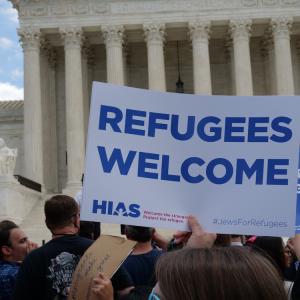
'Refugees Welcome' sign at a Protest Rally at the U.S. Supreme Court. June 26, 2018 in Washington, D.C. Photo by Jerome460 / Shutterstock.com
A federal judge on Wednesday blocked the Trump administration from enforcing an executive order that would allow state and local governments to opt out of the refugee resettlement program.
What the Stories That Shaped 2019 Tell Us About 2020
Before we run head first into 2020 and all of the stressors of the coming election season, we wanted first to reflect on last year — to take a look at the top 10 stories that shaped our coverage, the commentary that spurred conversations, and the reflections that stirred the soul — and how the work will continue in the new year.
Questioning Faith After Purity Culture: In Conversation with Joshua Harris
Earlier this week, author and former pastor Joshua Harris — whose bestselling book I Kissed Dating Goodbye became go-to courtship advice for a generation of teens raised within 1990s-early 2000s evangelical purity culture — announced via Instagram that he and his wife were separating. In the post, he says, “In recent years, some significant changes have taken place in both of us. It is with sincere love for one another and understanding of our unique story as a couple that we are moving forward with this decision. We hope to create a generous and supportive future for each other and for our three amazing children in the years ahead."
Exploring a Holistic Sexuality in the Black Church: In Conversation With Rev. Lacette Cross
Amid ongoing conversations about the harm caused by a “purity” ethic taught within mostly evangelical churches in the 1990s-2000s (and for some, still today), a number of ethicists, theologians, pastors, and educators have been quietly shaping a new ethic — some for years.
Their Generation Was Shamed by Purity Culture. Here's What They're Building in Its Place
Some credit the negative reactions to purity culture as fueling the exodus of young adults from the evangelical church — in 2006, white evangelicals comprised 23 percent of Americans, and that dropped to 17 percent by 2016. As they have entered adulthood, become parents themselves, and have perhaps long since rejected a purity culture that they experienced as harmful to body and spirit, many find themselves left without anything to replace it. But a handful of pastors, writers, and activists have been finding their way forward — through shared storytelling, interpreting a more inclusive biblical sexual ethic, and offering new models for the church to talk about sexuality in a holistic, faithful way.
Toward a Less Toxic Discourse
To our readers,
As I’ve led our online coverage over the past seven years, I’ve constantly sought better and more efficient ways of connecting with you and hearing what you have to say in response to our reporting and commentary. I’m so grateful for the time you take to engage in the conversations we prompt, and you regularly provide our editors with encouragement, story ideas, and much-needed diversity of opinion.
'The World Hasn't Been Introduced To Christ'
A Q&A with 'The Great Reckoning' Author Stephen Mattson
"Surviving a Christianity That Looks Nothing Like Christ," the subheading of author Stephen Mattson's first book, The Great Reckoning, encapsulates what it means to many young, white current or former evangelicals to navigate, and in some cases, deconstruct the faith of their upbringing. From the exvangelical community, to #EmptythePews, to a clear break of some from the political allegiances of their parents' generation in a time of Trump, many white evangelicals are entering into this journey for the first time. Mattson, having done the same himself, offers somewhat of a blueprint — a look at some of the hypocricies within white American evangelicalism and a guide to finding important voices outside the dominant culture to help shape what comes next.
If Our Wounds Matter
Women across the world have broken open, offering their stories of abuse and assault in a shared scream, searching for a new normal so our daughters and sons won’t have to deal with the same. The response we see from men in leadership has been a series of temper tantrums at the prospect of having to change learned behavior.
'No Wall Between Amigos'
The crisis continues at the U.S.-Mexico border.
A SMALL WHITE CHAPEL sits just a couple hundred yards north of the Rio Grande river in Mission, Texas. While the chapel no longer hosts an active parish, its interior shows signs of frequent use. Prayer candles and silk flowers line the altar and the base of a shrine to Our Lady of Guadalupe. An entryway table holds dozens of prayers, written on folded loose-leaf paper. Children’s composition notebooks, filled with more handwritten prayers, are stacked in piles.
“Please watch over our brothers, sisters, and all the children being held hostage at the border,” one prayer says. And another: “Please bless our health & the children being separated from their parents @ the border.”
La Lomita Chapel is now part of a municipal park and serves as a rest stop for passersby—while Border Patrol trucks sit just outside the park entrance and a helicopter circles overhead. The chapel land was originally granted to Missionary Oblates of Mary Immaculate priests in the mid-1800s. Given its location—midway between mission centers in Brownsville and Roma, Texas—La Lomita served as a meeting place and “housed transient visitors to the mission,” according to a historic marker on the site.
I visited the chapel, quite by accident, during a reporting trip at the border at the height of the family separation crisis. The separation of parents and children moved the hearts—and wallets—of people across the nation. But that fervor waned after a U.S. District Court judge gave a July deadline for reunification and more than 1,500 children were reunited with their parents, largely thanks to the efforts of faith groups and advocates. For many, it seemed, the story was over. The reality is that the crisis continues.
As of this writing, 497 children remain separated from their parents, 22 of whom are under the age of 5. More than 300 parents have been deported, and many who signed a waiver to be reunited say they were coerced. Children, including some babies and toddlers, haven’t seen their parents in months. It’s likely that some of those children will never see their parents again.
Family Separation Is the Latest Eruption in an Ongoing Emergency
Over the past four months, news from the border has chronicled the stories of families detained and separated — many of them seeking asylum from gang violence in Central America. Children as young as 8 months have been taken from their parents and sent across the country to children’s shelters, privately run detention centers, and, some, to foster families. Now, 20 days after a court-imposed deadline, more than 550 children still have not been returned to their parents, at least 300 of whom have been deported.
Thursday Was the Deadline to Reunite Families. Hundreds of Children Are Still in U.S. Custody
U.S. District Judge Dana Sabraw earlier this week praised the government's efforts to reunify some of the more than 2,500 children who had been separated from their parents upon crossing the U.S.-Mexico border in advance of the July 26 deadline. Yet as of that deadline, 711 children ages 5-17 remain in U.S. custody. Another 46 children under the age of 5 also have yet to be reunited with their parents
4 Faith Groups Tapped to Receive Reunified Families Separated at the Border
Parents who have just been reunited with their children — after being separated, some for months, amid the implementation of the Trump administration’s “zero tolerance” immigration policy — are offered food, clothes, toys, and other essentials and are paired with background-checked volunteers to help them through the next steps of the process.


